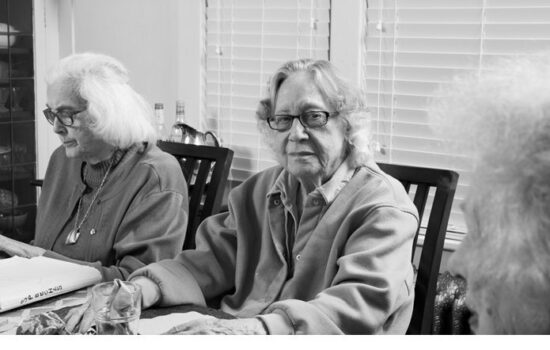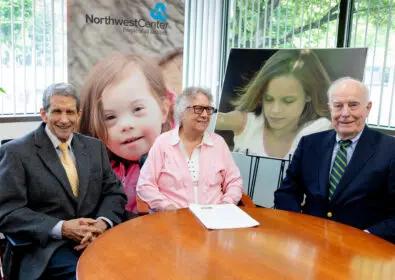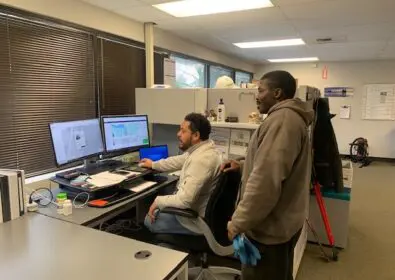She helped found Northwest Center and helped change the world for children with disabilities. But the way Janet Taggart sees it, she just did what she had to do.
Taggart’s daughter Naida was born in 1956 with a developmental disability and cerebral palsy. At the time, kids like her were considered “uneducable” and housed in institutions. It was those institutions that first sparked Taggart’s activism for people with disabilities. “A local institution had weekend tours. For a price, you could look at all the ‘funny people,’” she says with disgust. “That was to me the absolute bottom. Hell.”
But other options were few for Naida, who was turned away from public school and even Sunday school. A typical scene occurred when they tried to get Naida health insurance. “I filled out the application and they said I had to bring her in for an examination to see whether or not she qualified,” Taggart remembers. While she waited with Naida for their appointment, a doctor she knew walked through the lobby. That doctor urgently whispered to Taggart a kind of warning.
“She said, ‘What are you doing here? Get out of here!’” Taggart recalls. “I just said, ‘I gotta go; they’re calling me.’ But she knew what she was talking about. The doctor we saw never touched Naida; just glanced at her. He said, ‘Well, I’m sorry, we can’t enter her into membership.’ And I said, ‘Why?’ And he said, ‘Because she’s retarded.’ And I said, ‘I know.’” The exasperated emphasis Taggart puts on the last two words is humorous. But she’s clearly endured more than her share of exasperation through the years.
Toughening Up
The doctor’s stage whisper was a symptom of the culture of shame around disability that was much more overt at the time. When Taggart and other parents formed the Central School for the Severely Retarded, the rudimentary “basement school” held classes in loaned space at a local temple. The rabbi was sympathetic to their needs because he himself was the parent of a child with a developmental disability. But he forbade anyone to discuss it.
“That was an order. We were not to mention that,” Taggart says. A child with a disability was viewed as ‘obviously because of something you did wrong,” she explains.
Then there was the extra work the parents always seemed to have to do. At the Central School, they did everything from hiring teachers to cleaning the facilities. “The temple used it on the weekend,” she laughs wryly. “We had to move all of our equipment out on Friday, and then Monday, move all the stuff back in. A woman who was the manager always inspected the rooms for cleanliness and always had us come back for some extra cleaning!”
But hard work only strengthened Taggart’s resolve to make changes for her daughter. In a 1977 interview with the Seattle Times, she called it the same kind of “radicalizing, disillusioning, but toughening experience many youthful protestors got from going to jail.”
Making Breakthroughs
The basement schools also demonstrated that their kids could, in fact, learn. Taggart tells the story of how a woman named Margo, despite having no official teaching certification, helped Naida make a profound breakthrough. “Naida didn’t know what her limits were,” Taggart begins, meaning it in a literal sense. Naida had so much trouble navigating her surroundings that, at one point, she was diagnosed as blind. (“Which she isn’t. At all.”) Seattle Public Schools rejected Naida in part because they didn’t think she could learn to sit in a chair. Margo saw things differently.
“Margo wrapped her in a quilt, day after day. And somehow that made Naida feel that there were limits, you know? ‘My world is here, and here’s other people.’ It was a brilliant piece of work. Yet Margo had no qualifications for doing that, just some instinct that gave her the truth of what to do. And pretty soon,” Taggart concludes, “Naida was sitting in a chair.”
Taggart met the other women who would go on to found Northwest Center—Cecile Lindquist, Katie Dolan and later, Evelyn Chapman—when she formed a speakers bureau. The women presented slide shows not only to educate the public about what kids like Naida could learn, but to raise the money to help make it happen. (“I figured, as long as I’m doing education, I’m doing the money request.”)
By the time Northwest Center was up and running, the women were skilled at combating public perceptions about disability. But there was one foe Taggart could never persuade: the very person who was elected Northwest Center’s first board chairman, who began to reject students she felt would be too difficult to handle.
“I remember thinking that if I could persuade her to think right, I would conquer the world,” Taggart says. “I wanted everybody to come on board.”
Instead, she and other founders eventually had to “organize a revolution,” she says with a laugh. “We had a huge turmoil and we had terrible meetings. We ousted the people who were serving as administrators at Northwest Center. The whole board.”
She continues, “I think at that point, I said, ‘Oh, well, I can’t change me. I guess I’ll have to change the world.’”
She did with House Bill 90, “Education for All,” which paved the way for education rights across the nation. It’s a bill that she and the other founders wrote and lobbied into law by 1971.
More to Do
2015 marks Northwest Center’s 50th anniversary. It’s also the first year that Janet and Naida Taggart are living apart since 1956. Taggart moved into a retirement community not long ago, finding a place for Naida at a nearby group home. She’s confident Naida will thrive.
“She’s had a good background. She gets along well with people,” Taggart says. Though Naida has never spoken, she is good at communicating with others. “If she wants something, she will get it,” Taggart says. “She’ll have fun.”
With all she’s accomplished in the past 50 years, Taggart focuses on how much more there is to do. For decades, she’s made countless trips to the Statehouse, calls to legislators, written to newspaper editors and school officials, and even campaigned once for district representative. But politicians have continued to “chip away” at provisions in House Bill 90, she says.
She shakes her head as she relates how her grandson is in Special Ed in Seattle Public Schools which, in just five years, cycled through seven Special Ed directors. The solution, she says, is “political activism. But in my day we had the luxury of the father working and the mother being free all day. I’d like to see parent organizations, but how to do that, I don’t know. Parents work. They can’t run to Olympia five days a week like we had to do.”
“Had to do” is a telling phrase; Taggart isn’t interested in kudos for her work. When she’s asked what she’s most proud of, she instead shares another memory of that first Northwest Center board chair. “We were in the office, and she said, ‘Oh, I feel so good when I’m helping people. I just love to help these people.’ It was so degrading. I thought it was the most hideous thing I’d ever heard. Because we weren’t there to feel good,” Taggart says.
“I don’t think I ever took pride in what I did,” she continues. “I never thought, ‘Oh, I’m a wonderful person.’ We just did what we had to do. And I still don’t take any pride in it. If anything, I’m just grateful for having had the opportunity. I was just happy to have come along at a period of history where Naida was able to stay home so she could have a very active, normal life. Which she has. A regular member of the family and a regular member of the community. And a lot of fun.”



